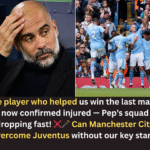Pep Guardiola’s Squad Size Ultimatum: The Philosophy Behind Manchester City’s Future

In a revelation that has sent shockwaves through the football world, Pep Guardiola has delivered an uncompromising ultimatum to Manchester City’s hierarchy: reduce the squad size or lose their legendary manager. The Catalan tactician’s stark warning came following City’s 3-1 victory over Bournemouth on Tuesday evening, where he witnessed five fully-fit players—Abdukodir Khusanov, Savinho, James McAtee, Claudio Echeverri, and Rico Lewis—excluded from the matchday squad entirely.
Guardiola’s words were as direct as they were decisive: “I said to the club I don’t want that. I don’t want to leave five or six players in the freezer. I don’t want that. I will quit. Make a shorter squad, I will stay.” This ultimatum represents more than just squad management preferences; it encapsulates Guardiola’s fundamental philosophy about team unity, player welfare, and the psychological dynamics that drive successful football teams.
The Philosophy of the Smaller Squad
Guardiola’s preference for compact squads is not a recent development but rather a consistent thread throughout his managerial career. From his early days at Barcelona through his tenure at Bayern Munich, the Spanish tactician has consistently advocated for quality over quantity. His reasoning extends far beyond tactical considerations, delving into the emotional and psychological well-being of his players.
“It’s impossible for my soul to tell my players in the tribune that they cannot play,” Guardiola explained with characteristic passion. This statement reveals the human side of management that often goes unnoticed in the tactical analysis and transfer speculation that dominates football discourse. For Guardiola, every player in his squad represents not just a tactical option but a human being with aspirations, dreams, and the fundamental desire to contribute to their team’s success.
The manager’s approach reflects a deeper understanding of squad dynamics that goes beyond the mathematical calculations of squad rotation. When players are consistently excluded from matchday squads despite being fully fit and available, it creates what Guardiola describes as a toxic atmosphere that can undermine the collective spirit essential for sustained success. The psychological impact on players who find themselves perpetually on the outside looking in can be devastating, not just for the individuals concerned but for the entire group dynamic.
The January Spending Paradox
The timing of Guardiola’s ultimatum is particularly significant given Manchester City’s substantial investment in the January transfer window. The club spent over £180 million on five new signings: Claudio Echeverri from River Plate (£12.5m), Abdukodir Khusanov from Lens (£33.5m), Vitor Reis from Palmeiras (£29.6m), Omar Marmoush from Eintracht Frankfurt (£59m), and Nico Gonzalez from Porto (£50m).
This spending spree was initially driven by necessity rather than luxury. Guardiola himself had publicly called for reinforcements in December, stating: “If we can, we have to add players, definitely. We struggle, especially in the back, in the middle.” The injury crisis that decimated City’s squad during the winter months, most notably the long-term absence of Ballon d’Or winner Rodri, forced the club’s hand in the transfer market.
However, the return of injured players has created the very situation Guardiola now finds untenable. The squad that was depleted by injuries in December and January has now become bloated with talent, creating the “freezer” scenario that the manager so vehemently opposes. This paradox highlights the challenges of squad planning in modern football, where clubs must balance immediate needs with long-term sustainability.
The Human Cost of Squad Bloat
Guardiola’s emphasis on the emotional and psychological aspects of squad management sets him apart from many of his contemporaries. His reference to his “soul” being unable to accept leaving players out speaks to a managerial philosophy that prioritizes human relationships alongside tactical success. This approach has been a hallmark of his most successful teams, where players have consistently spoken about feeling valued and integral to the collective mission.
The concept of players being left “in the freezer” is particularly poignant in the context of modern football’s physical and mental demands. Professional footballers dedicate their lives to the pursuit of playing opportunities, and being consistently excluded from matchday squads can have profound psychological effects. The impact extends beyond the individuals directly affected, as other squad members witness the treatment of their colleagues and may begin to question their own security within the group.
Guardiola’s insistence on maintaining a connection between all squad members reflects his understanding that football teams are complex social ecosystems. When significant numbers of players feel disconnected from the main objectives, it can create fractures that undermine the collective spirit essential for success at the highest level. As he noted, this season City “lost it a bit” in terms of the emotional connection within the squad, a situation he is determined to avoid repeating.
Squad Size in Modern Football Context
Manchester City’s current squad situation is not unique in modern football, but Guardiola’s response to it certainly is. City’s website lists 28 members of the first-team squad, plus four out on loan, which places them in the middle range compared to their Premier League competitors. Chelsea leads with 31 players and 21 on loan, while Brighton and Tottenham maintain 29-player squads. Arsenal operates with just 24 players, while Liverpool, Aston Villa, Everton, and Nottingham Forest all maintain exactly 25-player squads.
These numbers, however, don’t tell the complete story. While Premier League rules allow for 25-man squads with additional U21 players, the practical reality of managing such groups presents significant challenges. The logistics of training sessions, tactical preparation, and maintaining competitive intensity become increasingly complex as squad sizes grow. Guardiola’s preference for smaller groups allows for more intensive individual attention and clearer role definition for each player.
The financial implications are also significant. Maintaining large squads of high-quality players requires substantial investment not just in transfer fees and wages, but in support infrastructure, training facilities, and medical staff. From Guardiola’s perspective, the emotional and tactical costs outweigh any potential benefits of having extensive squad depth.
The Academy Alternative
Guardiola’s proposed solution to potential injury crises demonstrates his commitment to Manchester City’s long-term development philosophy. Rather than maintaining a bloated senior squad, he advocates for promoting academy players when injuries create gaps in the first team. “If I have injuries, unlucky, we have some players for the academy and we do it,” he stated with characteristic pragmatism.
This approach serves multiple purposes within Guardiola’s broader philosophy. It maintains the tight-knit atmosphere he values in senior squads while providing genuine opportunities for young players to develop alongside established stars. Academy graduates who earn their opportunities through injury cover often display the hunger and appreciation that can reinvigorate senior players who might otherwise take their positions for granted.
The strategy also aligns with Financial Fair Play considerations and Manchester City’s broader commitment to youth development. Rather than investing in expensive squad players who may rarely feature, the club can focus resources on elite talents who will play regularly while maintaining a pathway for homegrown talent to emerge.
Individual Cases: The Grealish Dilemma
The situation surrounding Jack Grealish exemplifies the human challenges inherent in Guardiola’s approach. The England international, acquired for £100 million four years ago, has seen his role diminish significantly since his starring contribution to City’s 2023 treble-winning campaign. With just seven Premier League starts this season and omission from the FA Cup final squad, Grealish represents exactly the type of situation Guardiola seeks to avoid.
Guardiola’s handling of the Grealish situation reveals both his pragmatism and his empathy. While acknowledging that decisions about the player’s future will involve director of football Hugo Viana and the player’s representatives, he also recognizes the human element: “There is not one player in my locker room, and I think all the locker rooms around the world, that is happy [when they] do not play.”
The Grealish case illustrates the broader challenge facing Manchester City and other elite clubs. Players of exceptional quality may find their opportunities limited not due to inadequate ability, but because of tactical evolution and competitive squad dynamics. Guardiola’s insistence on smaller squads is partly motivated by a desire to avoid placing players in such situations unnecessarily.
Tactical Implications of Squad Philosophy
Beyond the human considerations, Guardiola’s preference for smaller squads has clear tactical advantages. Intensive training sessions with focused groups allow for more detailed tactical preparation and greater cohesion in implementing complex playing systems. When every player in the squad has a realistic expectation of featuring regularly, the collective commitment to tactical discipline tends to be higher.
Smaller squads also facilitate the development of the versatility that has become a hallmark of Guardiola’s teams. When players know they may be called upon in multiple positions, their tactical education becomes more comprehensive. This flexibility has been crucial to City’s success, allowing them to adapt their shape and approach within games and across different competitions.
The intensive preparation possible with smaller groups also enables the rapid integration of tactical innovations. Guardiola’s teams are renowned for their ability to evolve tactically throughout seasons, and this adaptability is enhanced when working with a core group of players who can quickly absorb and implement new concepts.
Financial and Strategic Considerations
Guardiola’s ultimatum also carries significant financial implications for Manchester City. The club’s January spending spree was substantial, and the prospect of moving on players who have recently arrived represents potential financial losses. However, the manager’s track record suggests that his squad management decisions tend to prove beneficial in the long term.
The situation also highlights the broader challenge of balancing immediate competitive needs with sustainable squad management. While the temptation to acquire talented players when they become available is understandable, Guardiola’s approach suggests that long-term success requires more strategic patience and discipline.
From a sporting perspective, the manager’s insistence on maintaining squad harmony and player satisfaction may prove crucial in retaining the collective mentality that has driven City’s sustained success. Elite players have numerous options in the modern transfer market, and maintaining an environment where they feel valued and integral to the team’s objectives becomes increasingly important for player retention.
The Broader Impact on Manchester City’s Future
Guardiola’s ultimatum represents a defining moment for Manchester City’s strategic direction. The club must choose between accommodating their manager’s philosophy or potentially losing the architect of their most successful period. Given Guardiola’s track record and the clarity of his position, the choice seems straightforward, but the implementation will be complex.
The need to reduce squad size before adding new players will likely accelerate departure decisions that might otherwise have been delayed. Players who might have been retained as squad options may find themselves moved on to make room for new signings who will play more regular roles. This approach may seem harsh, but it aligns with Guardiola’s fundamental belief that every player deserves the opportunity to contribute meaningfully.
The situation also sets an important precedent for future transfer planning. Rather than making opportunistic signings based on player availability or market conditions, City will need to maintain stricter discipline in their recruitment strategy. Every addition will need to be justified not just in terms of quality and tactical fit, but in terms of their likely playing opportunities and impact on squad dynamics.
Conclusion: The Philosophy of Purpose
Pep Guardiola’s ultimatum to Manchester City represents more than a managerial preference; it embodies a fundamental philosophy about the purpose and nature of professional football teams. His insistence on smaller squads reflects a deep understanding of the human elements that drive sporting success, recognizing that tactics and talent alone are insufficient without the collective commitment that comes from every player feeling valued and purposeful.
The challenge now facing Manchester City is to align their strategic planning with this philosophy while maintaining their competitive edge in an increasingly demanding football landscape. The decisions made in response to Guardiola’s ultimatum will likely define not just the immediate future of the club, but their approach to team building for years to come.
As the football world watches how this situation unfolds, Guardiola’s stance serves as a reminder that success in elite sport requires more than just assembling talented individuals. It demands the creation of environments where every participant feels essential to the collective mission, where human dignity is preserved alongside competitive ambition, and where the pursuit of trophies never comes at the expense of the values that make sport meaningful.
The resolution of this ultimatum will be closely monitored by clubs, players, and observers throughout football, as it may well establish new standards for how elite teams balance squad management with human consideration in the modern game. Guardiola’s willingness to stake his career on these principles demonstrates the depth of his conviction and the importance he places on maintaining the culture that has made Manchester City one of the world’s most successful football clubs.















